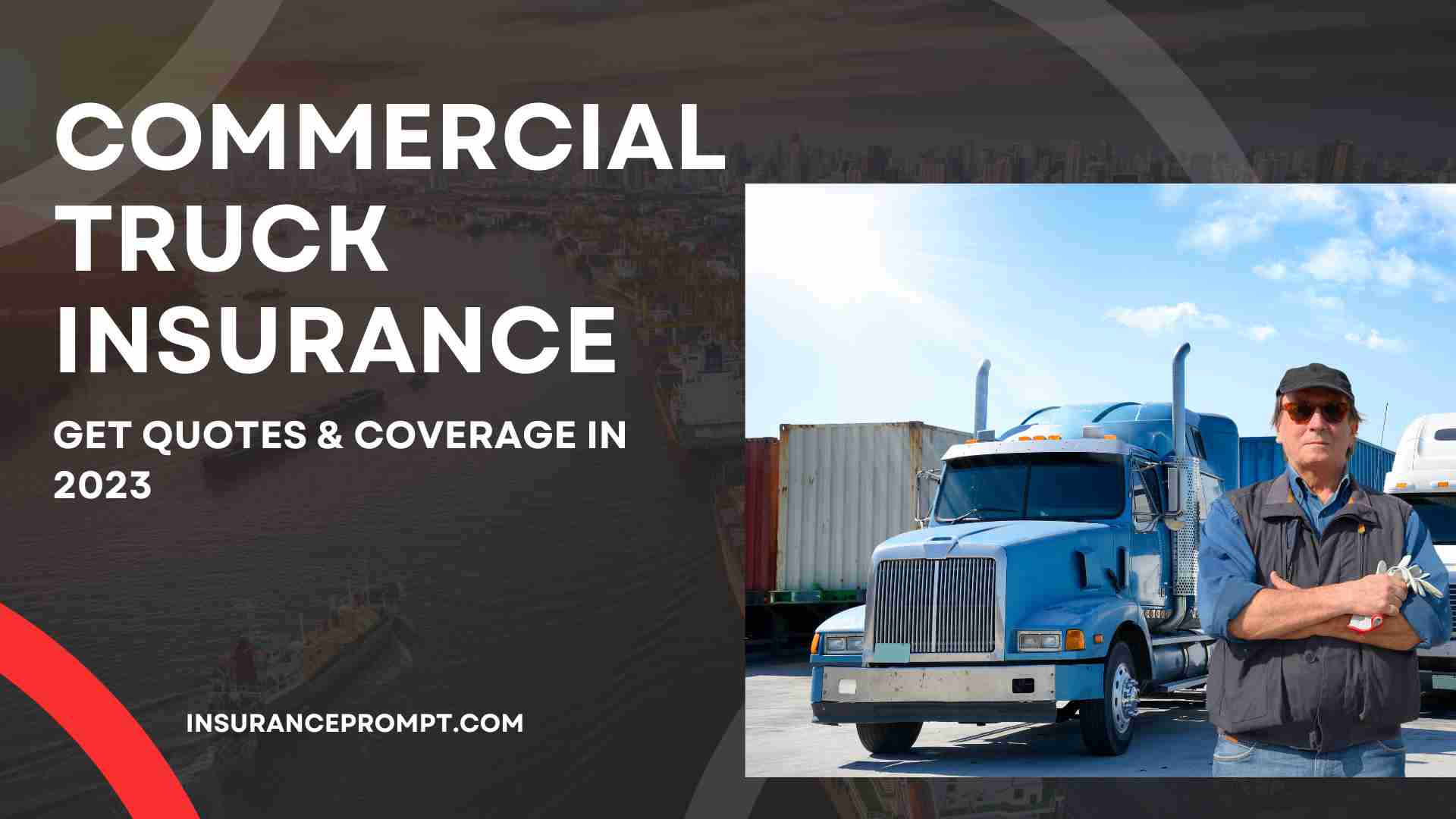Introduction
As we enter 2024, the commercial trucking industry continues to be a vital component of our economy. With that in mind, securing reliable and affordable commercial truck insurance is more crucial than ever for business owners and operators.
This comprehensive guide will provide you with essential information on different types of coverage available, factors affecting premiums, getting quotes from top providers, and how investing in truck insurance can protect your assets while giving you peace of mind.
Key Takeaways
- Commercial truck insurance is crucial for protecting business assets, complying with state and federal regulations, and ensuring financial security in case of accidents or other unforeseen events.
- Coverage options include liability, physical damage, cargo, bobtail, non-trucking liability, and general liability insurance. Choosing the right coverage depends on cargo value, driving routes, industry risks, etc.
- Several factors, like the driving records of drivers or the age/value of the truck, influence premiums. When selecting an appropriate policy, balancing legal compliances and adequate protection for your business needs is essential.
- Investing in commercial truck insurance from trustworthy providers can provide businesses peace of mind knowing they’re compliant with necessary regulations while protecting themselves from potential losses due to accidents or damages caused while operating commercial vehicles.
Table of Contents
Who Requires Commercial Trucking Insurance?
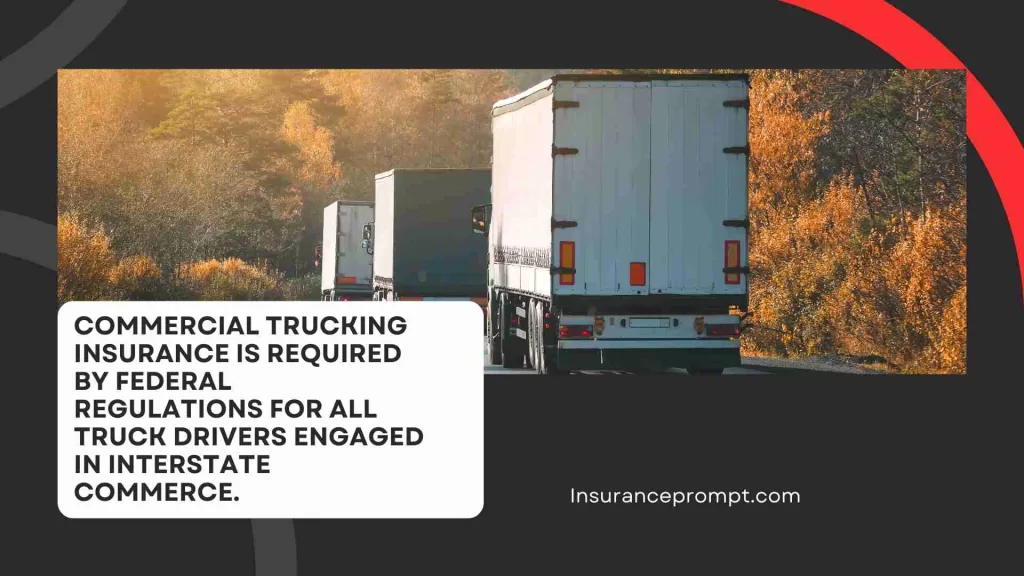
Small business owners and operators in the trucking industry must comply with specific commercial trucking insurance requirements. The Federal Motor Carrier Safety Administration (FMCSA) mandates a minimum insurance coverage amount, while the Department of Transportation (DOT) requires proof of liability insurance for the Operating Authority/MC Number.
Commercial trucking insurance requirements vary based on the state, truck size, cargo type, and driver’s experience. For instance, trucks carrying non-hazardous freight above a certain weight may require a specific level of primary liability coverage. In certain states like California, commercial truck insurance requirements surpass those applicable to most motorists.
Business owners must consult an insurance agent to ensure compliance and adequate coverage. These professionals can provide guidance and customize coverage to meet their commercial trucking operations’ unique needs.
The Importance Of Commercial Truck Insurance
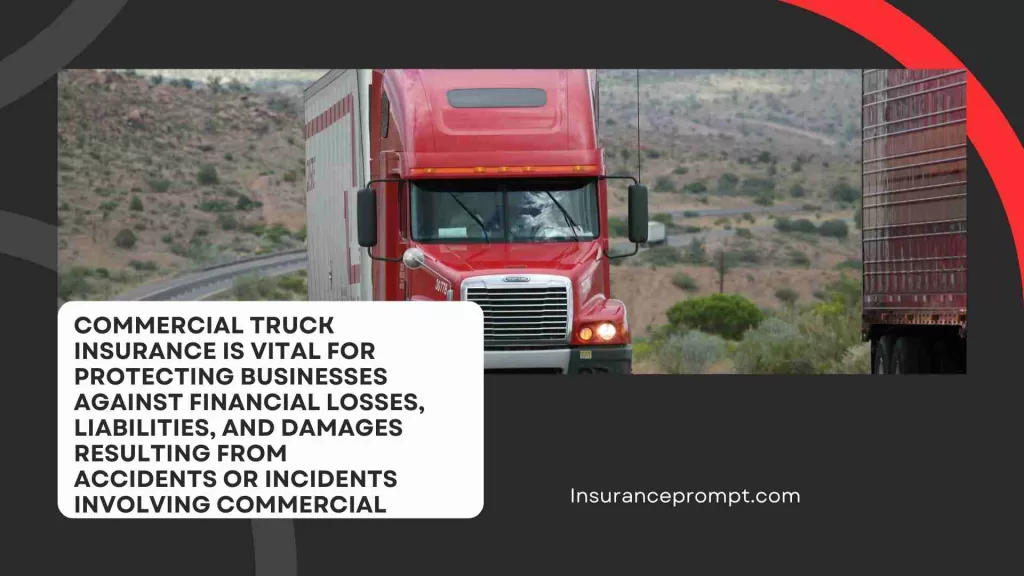
Commercial truck insurance is crucial for business owners to protect their assets, comply with state and federal regulations, and ensure financial security in case of accidents or other unforeseen events.
Protection Against Accidents And Damages
One of the primary reasons to invest in commercial truck insurance is the protection it provides against accidents and damages. In 2023, roadways will continue to be filled with potential hazards, making it vital for business owners and operators to shield themselves from costly financial consequences that could arise from such unfortunate incidents.
Commercial truck insurance covers various expenses related to collisions or other types of damages sustained by vehicles within a fleet.
To illustrate this point further, imagine facing an accident where your cargo gets damaged or lost altogether. Without adequate coverage, you would be left shouldering these losses on your own – potentially crippling your business financially.
Investing in comprehensive commercial truck insurance that includes both physical damage and cargo coverage ensures that any losses occurring during transport are promptly addressed and reimbursed by your insurance provider.
Compliance With State And Federal Regulations
Commercial truck insurance is important for protecting a business against accidents and damages and ensuring compliance with state and federal regulations.
Depending on the type of cargo being transported, certain insurance coverage may be required by law. For instance, trucking companies transporting hazardous materials must have specific cargo insurance to comply with the Department of Transportation’s regulations.
Additionally, liability coverage is mandatory in almost all states for commercial trucks operating on public roads. Failure to maintain proper insurance coverage can result in fines and legal consequences that can harm a business’s reputation and financial stability.
Financial Security
One of the most important reasons why commercial truck insurance is necessary for businesses that operate trucks is financial security. Accidents and damages to a commercial vehicle can often lead to significant expenses, including medical bills, repair costs, and legal fees.
These expenses can quickly add up and strain a business’s finances without proper insurance coverage.
Moreover, having adequate commercial truck insurance coverage ensures that businesses comply with state and federal regulations. Most states require minimum liability coverage levels for commercial vehicles operating within their borders.
Failure to meet these requirements could result in hefty fines or even the loss of driving privileges.
Types Of Commercial Truck Insurance Coverage
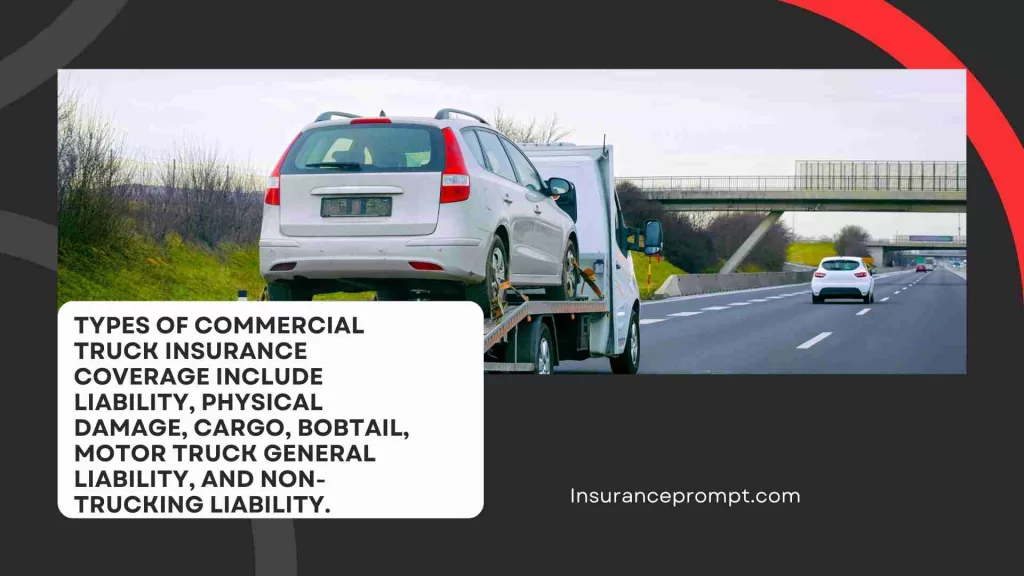
Commercial truck insurance coverage options include liability, physical damage, cargo, bobtail, non-trucking liability, and general liability insurance.
Liability Insurance
Liability insurance is necessary coverage for any trucking business. This type of insurance protects you in case your truck or driver causes damage to someone else’s property or injures another person.
Liability coverage comes in two forms: bodily injury and property damage. Bodily injury liability will pay for the medical expenses, lost wages, and other costs associated with injuries sustained by other parties in an accident where your driver is at fault.
Choosing the right amount of liability coverage can be tricky, as different states have varying minimum requirements. It’s crucial to balance both legal compliances with adequate protection for your business needs.
Physical Damage Insurance
Physical damage insurance is a type of commercial truck insurance that covers the repair or replacement costs of your truck and trailer in case it gets damaged due to an accident, theft, vandalism, fire, or other unforeseen events.
This coverage compensates for damages caused to your commercial vehicle’s cab and trailer.
When purchasing physical damage insurance for your commercial vehicle in 2023, remember that factors such as the age and value of your truck can affect the cost of premiums.
Additionally, some providers may offer different types of deductibles depending on whether you choose comprehensive or collision coverage. Understanding what each deductible option entails is important before deciding which one to select.
Cargo Insurance
Cargo insurance is essential for commercial trucking companies transporting goods or cargo. This insurance covers the costs of damaged or lost cargo during transit, protecting the business from financial loss.
The amount of coverage needed will depend on the value of the cargo being transported and can be added to a liability policy. For example, if a truck carrying valuable merchandise is involved in an accident and some products are damaged, cargo insurance would cover those damages up to the policy limit.
According to experts, it’s crucial for commercial trucking businesses to have proper cargo insurance coverage since losses can quickly add up without it. Some statistics show that nearly 30% of all freight claims are related to damages incurred during transportation.
Bobtail Insurance
Bobtail insurance is a type of insurance that provides coverage for trucks when they are being driven without a trailer attached. It’s important to note that this type of insurance only covers the truck and not any cargo being carried.
Bobtail insurance can be useful for owner-operators who use their trucks for personal and business purposes, as it provides liability coverage in case of an accident or damage caused by the truck itself.
Factors that can affect bobtail insurance premiums include driving record, driver age, and claims history.
Non-Trucking Liability Insurance
Non-Trucking Liability Insurance is a policy that covers the owner-operator when they are driving their truck for non-business use. This type of insurance provides liability coverage in case of accidents or damages caused by the owner-operator’s vehicle while not under dispatch from a motor carrier.
It’s important to note that this type of insurance only covers the owner-operator while using their vehicle for personal reasons. When operating with motor carriers or under dispatch, businesses need additional commercial trucking insurance policies such as liability insurance, cargo insurance, and physical damage insurance.
General Liability Insurance
General liability insurance is a crucial component of commercial truck insurance that protects businesses from third-party claims related to property damage or bodily injury.
This type of coverage can help cover legal fees, medical expenses, and other costs associated with lawsuits if someone sues the business due to an accident involving one of their trucks.
Businesses need adequate general liability coverage since accidents can happen at any time. In fact, according to the National Highway Traffic Safety Administration (NHTSA), over 4 million large truck crashes were reported in 2019 alone.
Choosing the right amount and type of coverage will depend on various factors, such as the size of your fleet and your specific industry needs.
What is Not Covered by Cargo Insurance for Trucks?
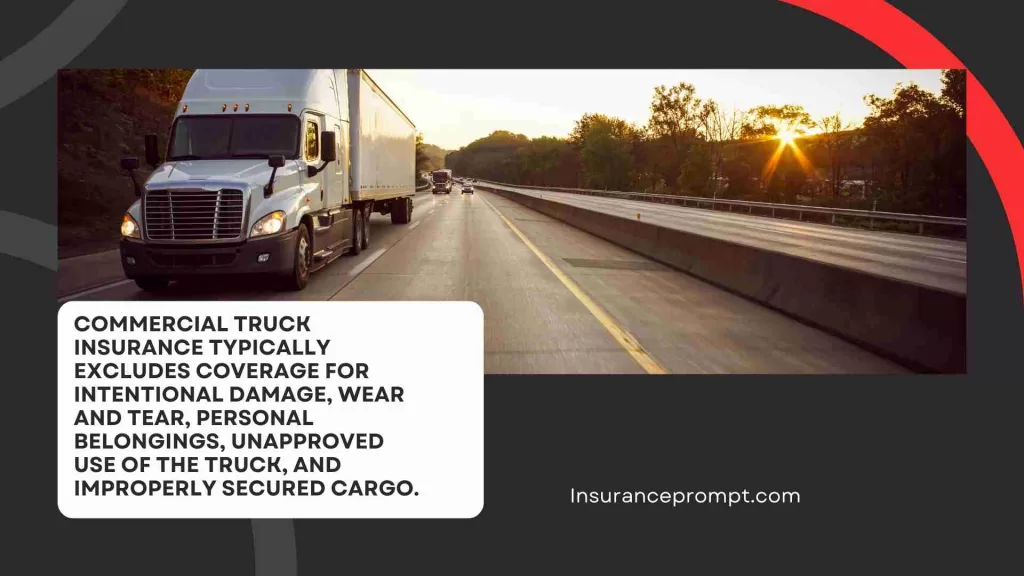
Commercial truck insurance typically covers liability, physical damage, and cargo. However, it’s crucial to be aware of certain exclusions that may vary based on the insurance company and policy. Here are some common exclusions found in commercial truck insurance:
- Intentional damage or illegal activities: Damages caused intentionally or from illegal actions may not be covered.
- Wear and tear or mechanical breakdowns: Regular wear and tear or mechanical breakdowns typically fall outside the scope of coverage.
- Personal belongings or non-commercial use of the truck: Insurance may not extend to personal belongings inside the truck or incidents unrelated to commercial use.
- Unapproved drivers or unapproved use of the truck: Damages resulting from unapproved drivers or unauthorized use of the truck may not be covered.
- Damage to unsecured or improperly packaged cargo: Losses related to unsecured or improperly packaged cargo might not be included in the coverage.
To fully comprehend the coverage and exclusions, it’s vital to carefully review the policy and seek clarification from the insurance agent. Asking questions is essential to grasp the extent of coverage the commercial truck insurance policy provides.
Finding a Commercial Trucking Insurance Agent in Texas
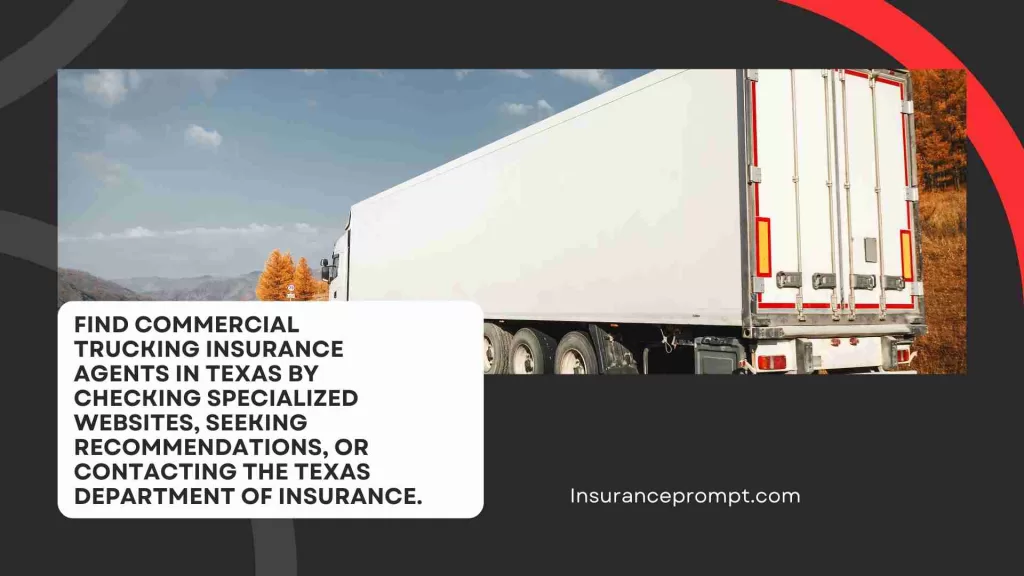
If you’re searching for a commercial trucking insurance agent in Texas, consider the following approaches:
- Explore reputable websites like Commercial Truck Insurance HQ, Thumann Agency, Reliance Partners, Insure My Rig, and Progressive Commercial.
- Look for specialized agents who focus on commercial trucking insurance in Texas. Seek recommendations from fellow truckers or trucking companies or conduct an online search.
- Contact the Texas Department of Insurance for a list of licensed agents providing commercial trucking insurance. Visit their website or utilize their hotline for assistance.
Once you have a list of potential agents, compare their rates, coverage options, and customer reviews to select the ideal one for your needs. Prioritize agents who demonstrate experience, reliability, and responsiveness to cater to your requirements as a trucker or trucking company.
Commercial Fleet Insurance Cost in Texas: Factors and Pricing in 2023.
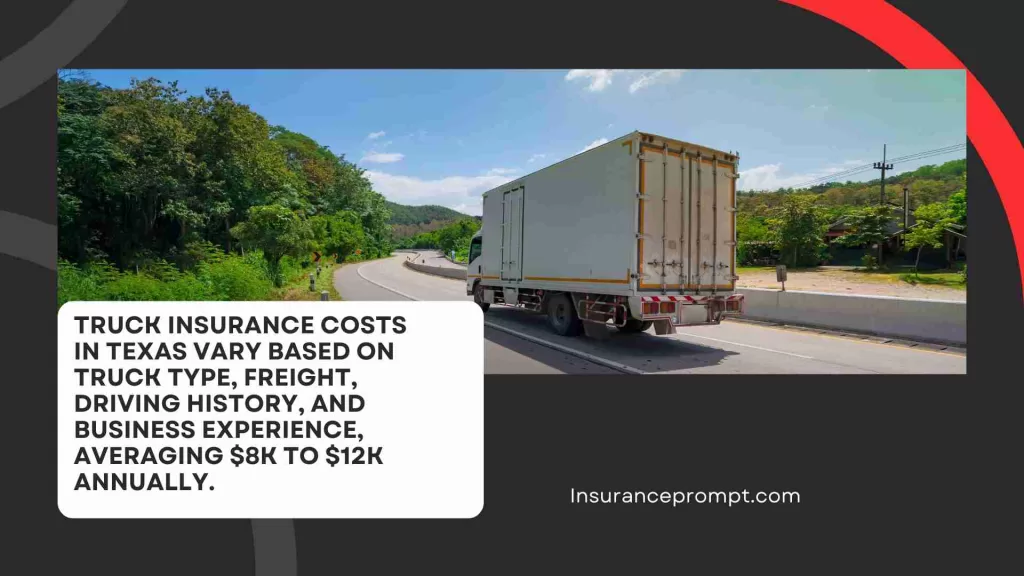
The cost of commercial truck insurance in Texas is influenced by several factors, including the nature of the freight transported, driving records, and business longevity. The average annual cost of commercial truck insurance in Texas for single-truck operations, requiring liability, cargo, and physical damage coverage, is approximately $13,6061.
However, alternative sources suggest an average range of $8,000 to $12,000 annually. For a single-truck operation operated by a Texas trucker with a clean driving history, the average monthly cost of commercial truck insurance is $1,1273.
It’s important to highlight that the actual cost can vary depending on the insurance company, coverage options, and other factors. To secure the best coverage at an affordable price, it is advisable to compare rates from multiple insurance providers.
How Much Does Commercial Truck Coverage Cost in Illinois?
The average cost of commercial truck insurance in Illinois is approximately $13,140 per year or $1,095 monthly. However, the actual cost can vary based on coverage type, truck size, and driver’s risks and experience.
Commercial truck insurance in Illinois primarily covers bodily injury and property damage expenses if the policyholder is at fault in an accident. Liability insurance is mandatory for all drivers in Illinois, including commercial truck drivers, protecting the policyholder and third parties involved in accidents caused by the policyholder.
It is essential to consult with an insurance agent to determine the appropriate coverage for a specific business and obtain an accurate insurance quote. They can offer guidance tailored to individual needs and help navigate the complexities of commercial truck insurance in Illinois.
Key Factors Influencing Business Truck Insurance Rates
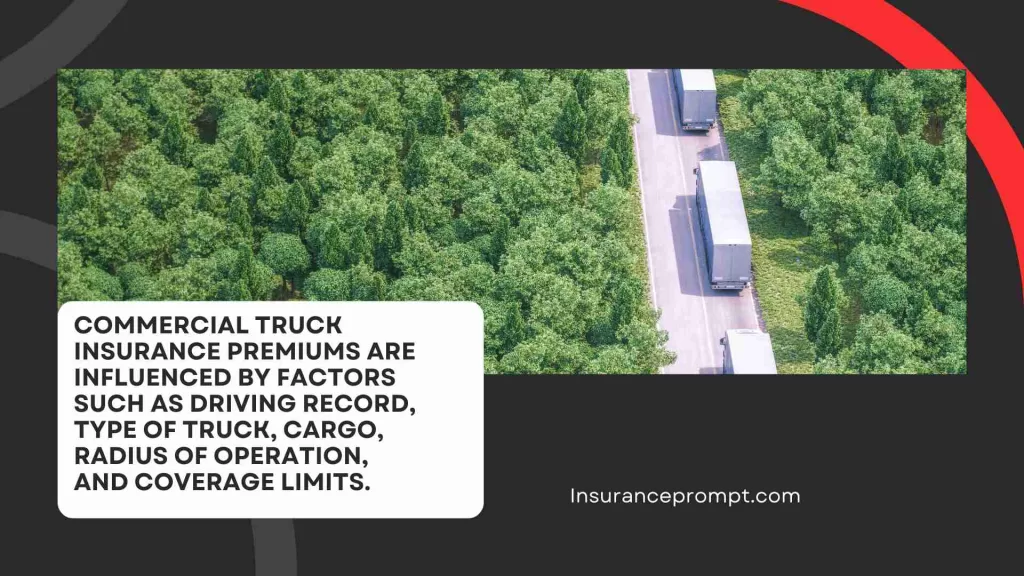
Commercial truck insurance premiums are influenced by several factors, including drivers’ driving records, type of cargo transported, size and age of the truck, and coverage limits.
Driving Record And Experience Of Drivers
The driving record and experience of drivers are essential factors that can affect commercial truck insurance premiums. Insurance companies assess the risk of insuring a particular driver based on their accident and traffic violation history and experience driving commercial vehicles.
For instance, if a company has hired seasoned drivers with several years of experience driving commercial trucks without any incidents or violations on their record, they will likely qualify for lower insurance rates.
However, new drivers or those with a history of accidents or traffic violations could face higher rates due to the increased risk presented by these factors.
Type Of Cargo Transported
The type of cargo transported is an important factor in determining the commercial truck insurance coverage needed. For instance, hazardous materials such as chemicals or explosives require specialized coverage due to the additional risk involved.
Carriers transporting perishable goods may need specific coverage for spoilage or refrigeration failures. Other types of cargo include general freight and machinery, which have unique risks and requirements.
Policyholders must also consider whether they’re transporting their goods locally or across state lines since some states have different regulations for transporting certain products.
Size And Age Of The Truck
The truck’s size and age significantly affect commercial truck insurance premiums. Generally, larger trucks have a higher risk of causing more severe damage in an accident than smaller ones.
Thus, insuring a large truck may require higher coverage limits and ultimately lead to higher premiums. Additionally, the age of the vehicle can also impact insurance rates, as older trucks are generally more prone to breakdowns or accidents due to wear and tear.
Businesses operating commercial trucks need to consider the size and age of their vehicles when seeking insurance coverage in 2023.
Coverage Limits
Commercial truck insurance policies typically have coverage limits, which refer to the maximum amount an insurance provider will pay for a claim. These limits can vary based on the type of coverage and the specific policy.
For example, liability insurance may have separate limits for bodily injury and property damage claims.
For instance, some states may require minimum liability insurance coverage for commercial trucks. However, this may not be enough to cover all damages or legal costs resulting from an accident.
On the other hand, choosing excessively high coverage limits can result in higher premiums and unnecessary expenses.
How To Get Quotes And Choose The Best Commercial Truck Insurance
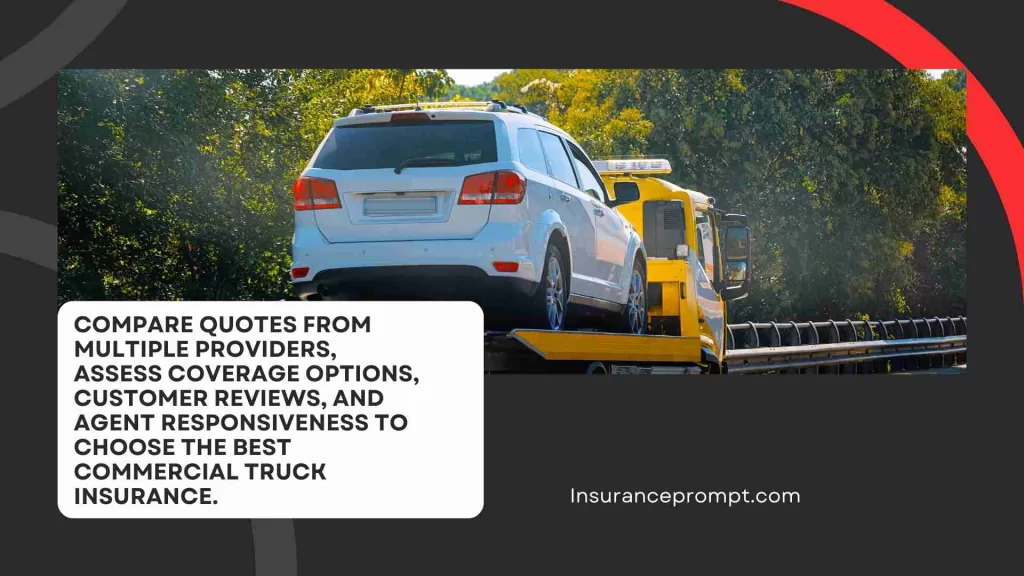
To get the best commercial truck insurance, research and compare providers, determine your coverage needs, gather necessary information for quotes, and obtain and compare quotes based on cost, coverage limits, claims process, discounts, and customer support.
Research And Compare Insurance Providers
Researching and comparing insurance providers before selecting a commercial truck insurance policy is essential. Review reviews from other customers, analyze deductibles and coverage limits, consider any additional benefits or discounts each provider offers, and review their claims process.
In addition to traditional insurers, non-traditional options like Peer-to-Peer (P2P) insurers allow individuals to pool resources together to provide cost-effective coverage for one another.
However, it’s important to note that non-traditional insurers may not be regulated like traditional ones.
Determine Your Coverage Needs
To determine your coverage needs for commercial truck insurance, you should consider the type of cargo you transport, the size and age of your truck, and the coverage limits required by state and federal regulations.
For example, transporting hazardous materials may require more comprehensive coverage to protect against potential environmental damage.
Additionally, assessing your financial situation and deciding on a budget for insurance premiums is important. Some insurance providers offer different levels of coverage that vary in cost depending on what is included.
Gather Necessary Information For The Quote Process
You must gather important information about your vehicles and drivers to get the best commercial truck insurance quotes for your business. You should have details such as the make and model of each vehicle, its value, age, VIN number, usage frequency, and history of accidents or traffic violations.
Additionally, you must provide details about your business operations, such as whether you employ owner-operators or company drivers and if they are covered under worker’s compensation insurance.
Insurance companies may also ask for previous claims history, financial statements, and other relevant documents during the quote process.
Obtain And Compare Quotes
Once you’ve determined your coverage needs, the next step is to obtain and compare commercial truck insurance quotes from various providers—research different insurance companies and their policies that align with your budget and requirements.
It’s important to gather necessary information, such as drivers’ driving records, the type of cargo transported, and the age and size of the truck, before seeking quotes.
Compare costs, deductible amounts, coverage limits, claims process timeframes, discounts offered by insurers (such as safe driver discounts), and customer support availability before deciding on a policy.
Remember that cheaper isn’t always better; sometimes, paying more can aid in receiving quality benefits such as roadside assistance or rental coverage.
Consider Factors Such As Cost, Coverage Limits, Claims Process, Discounts, And Customer Support
When choosing the best commercial truck insurance, it’s essential to consider several factors, such as cost, coverage limits, claims process, discounts, and customer support.
The cost of premiums is critical for businesses operating on a tight budget. However, it’s important not to sacrifice quality coverage for lower rates.
The claims process is also important when choosing commercial truck insurance providers. Businesses should look for efficient and reliable claims processing companies that can help them get back on the road as quickly as possible after an accident or damage occurs.
Discounts are another factor since they can significantly reduce premium costs and save money in the long run.
For instance, Milepost Insurance offers affordable rates and various policy options designed to meet different clients’ needs while providing personalized service throughout every stage of their quote experience.
Benefits Of Investing In Trucking Insurance
Investing in commercial truck insurance protects businesses against financial loss, legal compliance, improved reputation, and additional benefits such as roadside assistance and rental coverage.
Protection Against Financial Loss
Commercial truck insurance provides essential protection against financial loss for truck businesses. Accidents, theft, and other unforeseen events can incur significant costs if a business is not properly insured.
For example, liability insurance can help cover the costs of damages resulting from accidents caused by a company’s truck drivers. In contrast, cargo insurance can protect against losses from damaged or stolen cargo.
Additionally, physical damage insurance helps pay for repairs to vehicles damaged in accidents or other incidents. Without proper coverage, these costs could quickly add up and put a business at risk of financial ruin.
Legal Compliance
As a commercial trucking business owner, complying with state and federal regulations is crucial to avoid legal troubles. Commercial truck insurance helps satisfy this requirement as it’s mandatory by law.
Having the right coverage in place can protect your business from litigation or regulatory penalties, keeping you on the right side of the law. For instance, motor carriers must have liability insurance covering a certain amount per incident by law.
Besides compliance requirements, having commercial truck insurance protects drivers and cargo, minimizing potential risks that could put your business at risk for lawsuits or regulatory fines.
According to experts and research from [IMPORTANT FACTS], some of the best commercial truck insurance companies offer policies that comply with state and federal regulations while providing comprehensive protection against various liabilities, such as physical damage or public liability claims, if an accident occurs.
Improved Business Reputation
Investing in commercial truck insurance protects your business from financial loss, ensures legal compliance, and improves your business reputation.
For instance, suppose your company provides transportation services for valuable goods like technology equipment or perishable goods like food products. In that case, having cargo insurance will make clients feel more confident about entrusting their goods to you.
Commercial truck insurance is a crucial investment for any business hoping to maintain a positive reputation while ensuring compliance with state and federal regulations.
Additional Benefits Such As Roadside Assistance And Rental Coverage
Besides protecting against accidents and damages, commercial truck insurance policies include additional benefits such as roadside assistance and rental coverage.
Roadside assistance can help truck drivers deal with unexpected breakdowns or other issues while on the road, which can be especially helpful for long-haul trucking operations.
For example, GEICO offers both types of coverage as add-ons to their commercial auto insurance policies. Milepost Insurance also provides roadside assistance and rental reimbursement up to a certain limit for qualifying claims.
Investing in the right commercial truck insurance policy is crucial for any business that relies on trucks for transportation.
10 Leading Business Truck Insurance Companies
Here are ten leading commercial truck insurance companies based on research:
- Progressive
- State Farm
- Nationwide Insurance
- Farmers Insurance
- Chubb
- Berkshire Hathaway
- Liberty Mutual
- Travelers
- CoverWallet
- EIB Direct
Progressive, State Farm, and Nationwide Insurance are prominently mentioned in search results. Other companies include Farmers Insurance, Chubb, Berkshire Hathaway, Liberty Mutual, Travelers, CoverWallet, and EIB Direct.
How to file a claim for Commercial Fleet Insurance
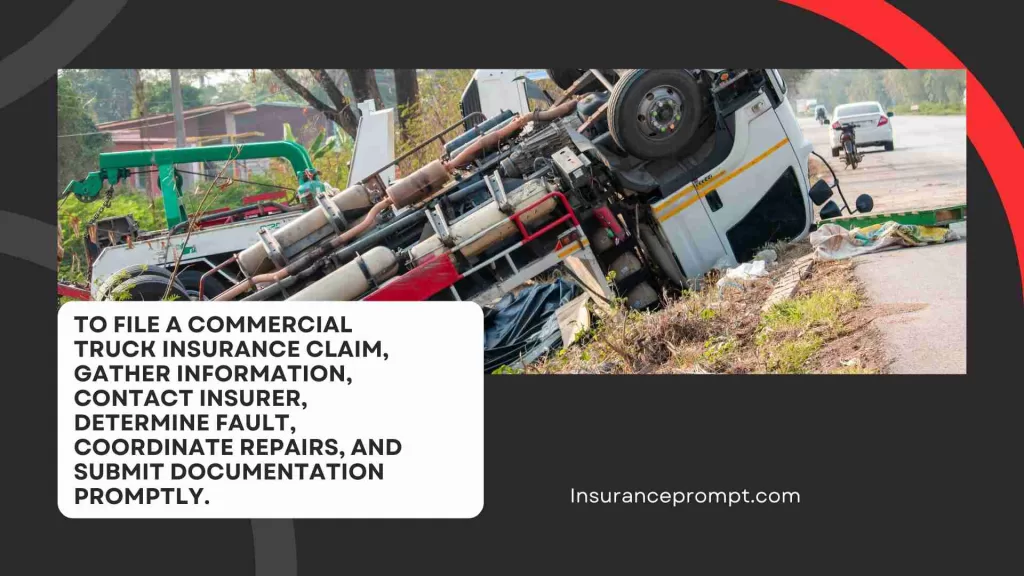
To file a claim for commercial truck insurance, follow these steps:
- Purchase the appropriate commercial trucking insurance: Ensure you have a valid driver’s license and insurance policy.
- Contact your insurance company: File a claim by calling your insurance agent or directly contacting your insurance company.
- Determine fault: Assess the accident’s fault as it can impact claim processing.
- Leave repair coordination to the insurance company: Choose one of their network truck repair shops for seamless coordination.
- Get necessary truck repairs: The insurance company will arrange and coordinate the repairs.
- Seek medical treatments if needed: Promptly seek medical attention if injuries occur.
- File the claim promptly: Delaying the claim due to incomplete information can hinder processing.
Having appropriate commercial truck insurance is vital to mitigate post-accident issues. Liability and cargo insurance forms must be submitted by the insurance company’s home office providing the coverage. Independent agents can facilitate a smooth commercial vehicle insurance claims process.
What information should be included in a commercial truck insurance claim?
When filing a commercial truck insurance claim, ensure you have the necessary information, including a valid driver’s license and insurance policy. Gather key details about the accident, such as the date, location, parties involved, and witnesses. Determining fault may also be necessary.
When reporting a commercial truck claim, you can entrust repair coordination to the insurance company’s network truck repair shops. Alternatively, if you prefer managing the claim independently, keep track of all receipts and invoices for repairs or services conducted.
How Long Does it take To Process commercial truck insurance Claims?
The processing time for a commercial truck insurance claim can vary based on multiple factors. Ideally, the claim is resolved within weeks or months. However, liability disputes can prolong the processing period.
Shortly after the accident, you or your commercial trucking representative may meet with a claims adjuster to assess the details and establish fault. When reporting the claim, you can rely on the insurance company’s network truck repair shops for repair coordination.
It’s important to note that commercial auto insurance policies typically impose a 30-day timeframe for filing a claim to ensure timely compensation.
FAQs:
What kind of coverage is typically included in commercial truck insurance policies?
Commercial truck insurance can include a variety of coverages, such as liability protection for damages or injuries caused by the truck driver, collision coverage for accidents involving the insured vehicle, comprehensive coverage for theft or damage unrelated to an accident, and cargo insurance to protect against losses or damages to transported goods.
How does my policy premium determine when getting commercial truck insurance quotes?
Many factors influence your commercial truck insurance premiums, including the type and value of your vehicles, their intended use and routes taken during the operation, level of experience, and driving history before claims activity on previous policies.
Are there any discounts available when purchasing commercial truck insurance?
Discounts may be available depending on the insurer and policy details being offered. For example, some insurers offer multi-vehicle discounts that apply when insuring multiple trucks with the same provider. In contrast, others may provide special rates if drivers hold certain safety certifications or have clean driving records over a while.
Is it possible to adjust my coverage levels throughout the year as needed?
Most providers allow changes to be made mid-term if your needs change due to seasonal fluctuations in business operations etc. Changes usually require contacting agents directly via phone or email. Still, many modern commercial providers offer online account management systems that enable customers to make required adjustments quickly & easily according to their unique needs without disrupting normal workflow patterns otherwise necessary.
Do Truckers Need General Liability Insurance?
Truckers often require general liability insurance to safeguard their business from lawsuits arising from operational incidents, covering bodily injury, property damage, and associated costs.
What is Commercial Truck Insurance Illinois?
Commercial truck insurance is mandatory for all drivers in Illinois, including commercial truck drivers, with a minimum liability coverage requirement of $25,000/$50,000. Federal liability limits typically range between $750,000 and $1,000,000. Physical damage and primary liability insurance are necessary for semi-trucks, while additional coverage, such as general liability and cargo insurance, may be required based on the specific business. Consulting with an insurance agent is essential to determine the appropriate coverage for a specific business’s needs.
What Does Illinois Commercial Truck Insurance Cover?
Commercial truck insurance in Illinois primarily covers expenses related to bodily injury and property damage in accidents where the policyholder is found at fault. Liability insurance is mandatory for all drivers in Illinois, including commercial truck drivers, safeguarding both the policyholder and third parties involved in accidents caused by the policyholder. Different configurations of commercial truck insurance are available in Illinois, including vehicle liability, motor truck cargo, physical damage, trailer exchange, and bobtail insurance. The cost of commercial truck insurance in Illinois varies based on coverage type, truck size, and driver’s risks and experience. It is crucial to consult with an insurance agent to determine the appropriate coverage for a specific business’s needs.
Which commercial truck insurance is the least expensive?
The most affordable truck insurance can be found by comparing costs from several companies. Rates can be affected by elements such the type of truck, driving history, and coverage requirements. Progressive is a possible option for cheap insurance due to its market share and discounts. Comparing quotations from several insurance companies is advised to discover the best deal.
Are there any options for no down payment commercial truck insurance?
There are several options for no down payment commercial truck insurance available. Premier Truck provides commercial truck insurance without requiring a down payment, reducing out-of-pocket expenses. TBS Factoring offers a Deferred Down Payment (DDP) program that defers up to 50% of the insurance down payment, free from hidden fees or interest charges. However, it’s important to note that many trucking insurance companies or commercial truck insurance brokers typically expect a 20-30% down payment for an annual policy.
Conclusion
In 2023, commercial truck insurance will continue to be a vital investment for any business in the transportation industry. Whether you are an owner-operator or manage a fleet of trucks, you must have the right coverage to protect your assets and comply with state and federal regulations.
You can get affordable insurance that meets your needs by researching and comparing quotes from trusted providers.
Citation
Types of Auto Coverage…And Why You Need Them. https://www.doreninsurance.com/post/types-of-auto-coverage-and-why-you-need-them
Workers Comp Insurance | CreditSpeak. https://creditspeak.com/workers-comp-insurance/
California Commercial Truck Insurance Requirements – revinsurance.com. https://www.revinsurance.com/california-commercial-truck-insurance-requirements/
Dodge Ram 1500 Auto Insurance (Average Rates + Coverage) • Save yourself! https://gaskmedics.com/cheap-auto-insurance/12446-dodge-ram-1500-auto-insurance-average-rates-coverage/
Business Insurance 101: General Liability | Staples & Associates MD & DE. https://staplesagency.com/business-insurance-101-general-liability/
What is engineering insurance in America? https://www.us7p.com/what-is-engineering-insurance-in-america/
Oregon Contractors Insurance | Buy Construction Insurance Now. https://contractorsliability.com/oregon-contractor-insurance/
Where do most bicycle accidents occur? https://www.rochesterpersonalinjurylaw.com/about/faqs/bicycle-accident-questions/where-do-most-bicycle-accidents-occur
Harrell Insurance Agency Blog: basics. https://www.harrell-insurance.com/blog/tag/basics/
Top 11 How Much Is Commercial Truck Insurance In Texas? https://f4vn.com/how-much-is-commercial-truck-insurance-in-texas/
Commercial Truck Insurance | Your Car Dealer Bond LLC. https://www.cal-surety.com/commercial-truck-insurance/
4 Incidents Not Covered By General Liability | [astCompanyName]. https://spiveyinsurancegroup.com/blog/4-incidents-covered-general-liability-insurance/
Home – Cemetery Collaboratory – LibGuides at the University of Richmond. https://libguides.richmond.edu/EastEndCollaboratory
Atlanta Auto Insurance | Richardson Insurance Agency in Atlanta, Texas. https://www.heritage-ins.com/auto-insurance
Insurance for Small Business – Buschbach Insurance Agency, Inc.. https://www.amerimexchicago.com/blog/insurance-for-small-business.aspx
Progressive commercial truck insurance reviews. https://wellart.se/rf9x4xs1/852648-progressive-commercial-truck-insurance-reviews
Citroen C3 Extended Warranty – Extended Car Warranty | Used Car Warranty | Extendedcarwarrantyrates.com. https://extendedcarwarrantyrates.com/citroen-c3-extended-warranty/
Defining Homeowners Insurance: What Does It Cover? https://thefieldsofgreen.com/defining-homeowners-insurance/
Transportation – Industry Solutions – Towne Insurance | VA and NC. https://www.towneinsurance.com/business/industry/transportation
- Does M&S Do Car Insurance? A Full Guide In 2024 - April 15, 2024
- Pet Insurance for Older Dogs: 2024 Full Guide & Top Providers - March 17, 2024
- Small Business Equipment Breakdown Insurance: Full Coverage - November 6, 2023

